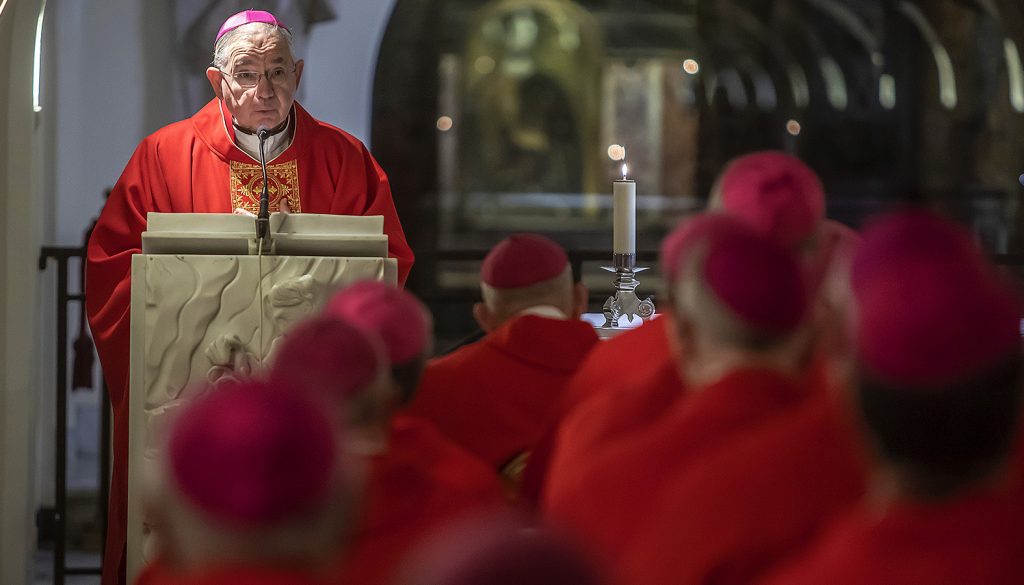I am writing to you this week from the Eternal City of Rome.
I have come here, along with my brother bishops from California, Nevada, and Hawaii for our “ad limina apostolorum” visit.
Each diocesan bishop in the world is required to come “to the thresholds of the apostles” once every five years to report to the pope on the state of the faith in his diocese.
We are here for a week, and each day is packed with meetings with Vatican officials in various departments, where we discuss our progress in areas such as evangelization, education, pastoral care, and social outreach.
There is also a deep spiritual component to our visit, as we meet and pray with the Holy Father and celebrate the Eucharist at the tombs of St. Peter and St. Paul, the first pillars of the Church.
The Roman Catholic Church is like no other institution we know in the world or in history. Because the Church is not only a human organization, it is a divine body.
Living as we do in a secularized and materialistic culture, we tend to see only the Church’s “human” element, and often then we focus only on the failings of men and women who belong to the Church, especially those in leadership.
But we cannot stop with only earthly and historic considerations. We need to understand the supernatural element, the Church as also holy and apostolic.
Jesus Christ founded his Church to be a sign and instrument of his saving presence in the world.
He chose Peter to be “the rock” on which to build his Church and called Peter to give his people spiritual food and to strengthen and encourage his brother bishops. He called Paul to lead the Church’s mission of proclaiming his Gospel to all peoples and establish his Church in every land and nation.
So, I find this pilgrimage to the apostles’ tombs is deepening my sense of communion with the universal Roman Catholic Church and renewing my own vocation as a bishop.
But every bishop is at the same time a link in a spiritual chain that connects us to those first 12 apostles who were called by the Lord.
And in our prayer and reflection this week, I am reminded that the apostles were ordinary men.
As we read in the New Testament, the apostles did not always understand what their Master wanted them to do. Sometimes they could be tempted by ambition, like when they argued among themselves about who was the greatest.
Jesus understood their limitations but he chose them anyway. This is still true about the bishops he calls today. We are human and that means we are not perfect. Yet Jesus knows that we love him and we want to follow him and to lead others to meet him and to give their lives to him.
And in this mission, I continue to draw strength from the story of the apostles and the miracle of the loaves and fishes.
As we recall, Jesus took the loaves, gave thanks, and then had the apostles give the bread to the people. At the end, he asks them to gather the leftovers. These leftovers fill exactly 12 baskets, one for each of the apostles.
It is a powerful story about the Word of God and the Bread of Life and the mission we have to love him and to feed his sheep, as he once said to St. Peter.
As bishops, we can do nothing without Jesus. But with him, all things are possible.
So, at the threshold of the apostles, I am praying for myself and my brother bishops, that we might have the courage to stay close to Jesus, to offer him everything in love, confident that he will bless and multiply the good works we do, just as he multiplied the loaves and fishes that the apostles brought to him.
Pray for me this week and I will be praying for you from the Eternal City.
And as one of the saints said, “All with Peter to Jesus through Mary!”
We know that Peter and the apostles were close to Jesus’ mother during our Lord’s earthly ministry and when the Church was born at Pentecost.
So let us ask our Blessed Mother to give us all a new devotion to her, and may she intercede for bishops, that we might be the leaders, the shepherds that her Son calls us to be.

